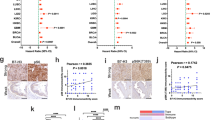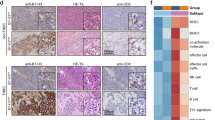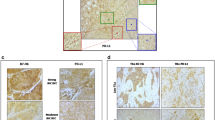Abstract
The interaction between tumor and the immune system is still poorly understood. Significant clinical responses have been achieved in cancer patients treated with antibodies against the CTLA4 and PD-1/PD-L1 checkpoints; however, only a small portion of patients responded to the therapies, indicating a need to explore additional co-inhibitory molecules for cancer treatment. B7-H3, a member of the B7 superfamily, was previously shown by us to inhibit T-cell activation and autoimmunity. In this study, we have analyzed the function of B7-H3 in tumor immunity. Expression of B7-H3 was found in multiple tumor lines, tumor-infiltrating dendritic cells, and macrophages. B7-H3-deficient mice or mice treated with an antagonistic antibody to B7-H3 showed reduced growth of multiple tumors, which depended on NK and CD8+ T cells. With a putative receptor expressed by cytotoxic lymphocytes, B7-H3 inhibited their activation, and its deficiency resulted in increased cytotoxic lymphocyte function in tumor-bearing mice. Combining blockades of B7-H3 and PD-1 resulted in further enhanced therapeutic control of late-stage tumors. Taken together, our results indicate that the B7-H3 checkpoint may serve as a novel target for immunotherapy against cancer.
Similar content being viewed by others
Log in or create a free account to read this content
Gain free access to this article, as well as selected content from this journal and more on nature.com
or
References
Sharpe AH, Freeman GJ . The B7-CD28 superfamily. Nat Rev Immunol 2002; 2:116–126.
Nurieva RI, Liu X, Dong C . Yin–Yang of costimulation: crucial controls of immune tolerance and function. Immunol Rev 2009; 229:88–100.
Martin-Orozco N, Dong C . Inhibitory costimulation and anti-tumor immunity. Semin Cancer Biol 2007; 17:288–298.
Curiel TJ, Wei S, Dong H, et al. Blockade of B7-H1 improves myeloid dendritic cell-mediated antitumor immunity. Nat Med 2003; 9:562–567.
Fong L, Small EJ . Anti-cytotoxic T-lymphocyte antigen-4 antibody: the first in an emerging class of immunomodulatory antibodies for cancer treatment. J Clin Oncol 2008; 26:5275–5283.
McDermott DF, Atkins MB . PD-1 as a potential target in cancer therapy. Cancer Med 2013; 2:662–673.
Topalian SL, Hodi FS, Brahmer JR, et al. Safety, activity, and immune correlates of anti-PD-1 antibody in cancer. New Engl J Med 2012; 366:2443–2454.
Boorjian SA, Sheinin Y, Crispen PL, et al. T-cell coregulatory molecule expression in urothelial cell carcinoma: clinicopathologic correlations and association with survival. Clin Cancer Res 2008; 14:4800–4808.
Singh M, Khong H, Dai Z, et al. Effective innate and adaptive antimelanoma immunity through localized TLR7/8 activation. J Immunol 2014; 193:4722–4731.
Chapoval AI, Ni J, Lau JS, et al. B7-H3: a costimulatory molecule for T cell activation and IFN-gamma production. Nat Immunol 2001; 2:269–274.
Sun M, Richards S, Prasad DV, Mai XM, Rudensky A, Dong C . Characterization of mouse and human B7-H3 genes. J Immunol 2002; 168:6294–6297.
Prasad DV, Nguyen T, Li Z, et al. Murine B7-H3 is a negative regulator of T cells. J Immunol 2004; 173:2500–2506.
Suh WK, Gajewska BU, Okada H, et al. The B7 family member B7-H3 preferentially down-regulates T helper type 1-mediated immune responses. Nat Immunol 2003; 4:899–906.
Leitner J, Klauser C, Pickl WF, et al. B7-H3 is a potent inhibitor of human T-cell activation: no evidence for B7-H3 and TREML2 interaction. Eur J Immunol 2009; 39:1754–1764.
Sun J, Chen LJ, Zhang GB, et al. Clinical significance and regulation of the costimulatory molecule B7-H3 in human colorectal carcinoma. Cancer Immunol Immunother 2010; 59:1163–1171.
Zhang G, Xu Y, Lu X, et al. Diagnosis value of serum B7-H3 expression in non-small cell lung cancer. Lung Cancer 2009; 66:245–249.
Zang X, Thompson RH, Al-Ahmadie HA, et al. B7-H3 and B7x are highly expressed in human prostate cancer and associated with disease spread and poor outcome. Proc Natl Acad Sci USA 2007; 104:19458–19463.
Martin-Orozco N, Muranski P, Chung Y, et al. T helper 17 cells promote cytotoxic T cell activation in tumor immunity. Immunity 2009; 31:787–798.
Gabrilovich DI, Nagaraj S . Myeloid-derived suppressor cells as regulators of the immune system. Nat Rev Immunol 2009; 9:162–174.
Dezfouli S, Hatzinisiriou I, Ralph SJ . Enhancing CTL responses to melanoma cell vaccines in vivo: synergistic increases obtained using IFNgamma primed and IFNbeta treated B7-1+ B16-F10 melanoma cells. Immunol Cell Biol 2003; 81:459–471.
He L, Hakimi J, Salha D, Miron I, Dunn P, Radvanyi L . A sensitive flow cytometry-based cytotoxic T-lymphocyte assay through detection of cleaved caspase 3 in target cells. J Immunol Methods 2005; 304:43–59.
Sznol M, Chen L . Antagonist antibodies to PD-1 and B7-H1 (PD-L1) in the treatment of advanced human cancer--response. Clin Cancer Res 2013; 19:5542.
Hashiguchi M, Kobori H, Ritprajak P, Kamimura Y, Kozono H, Azuma M . Triggering receptor expressed on myeloid cell-like transcript 2 (TLT-2) is a counter-receptor for B7-H3 and enhances T cell responses. Proc Natl Acad Sci USA 2008; 105:10495–10500.
Chen JT, Chen CH, Ku KL, et al. Glycoprotein B7-H3 overexpression and aberrant glycosylation in oral cancer and immune response. Proc Natl Acad Sci USA 2015; 112:13057–13062.
Crispen PL, Sheinin Y, Roth TJ, et al. Tumor cell and tumor vasculature expression of B7-H3 predict survival in clear cell renal cell carcinoma. Clin Cancer Res 2008; 14:5150–5157.
Roth TJ, Sheinin Y, Lohse CM, et al. B7-H3 ligand expression by prostate cancer: a novel marker of prognosis and potential target for therapy. Cancer Res 2007; 67:7893–7900.
Sun Y, Wang Y, Zhao J, et al. B7-H3 and B7-H4 expression in non-small-cell lung cancer. Lung Cancer 2006; 53:143–151.
Zang X, Sullivan PS, Soslow RA, et al. Tumor associated endothelial expression of B7-H3 predicts survival in ovarian carcinomas. Mod Pathol 2010; 23:1104–1112.
Castriconi R, Dondero A, Augugliaro R, et al. Identification of 4Ig-B7-H3 as a neuroblastoma-associated molecule that exerts a protective role from an NK cell-mediated lysis. Proc Natl Acad Sci USA 2004; 101:12640–12645.
Liu D, Bryceson YT, Meckel T, Vasiliver-Shamis G, Dustin ML, Long EO . Integrin-dependent organization and bidirectional vesicular traffic at cytotoxic immune synapses. Immunity 2009; 31:99–109.
Liu D, Peterson ME, Long EO . The adaptor protein Crk controls activation and inhibition of natural killer cells. Immunity 2012; 36:600–611.
Acknowledgements
This work was supported by grants from Beijing Municipal Science and Technology (Z171100000417005 to CD) and supported in part by grant from the National Natural Science Foundation of China (81502462 to LN). CD is a Bayer Chair Professor of Tsinghua University.
Author information
Authors and Affiliations
Corresponding author
Additional information
( Supplementary information is linked to the online version of the paper on the Cell Research website.)
Supplementary information
Supplementary information, Figure S1
Comparison of solid tumor and matched normal profiles for B7H3 expression, grouped by tissue type. (PDF 39 kb)
Supplementary information, Figure S2
Expression of B7-H3 and its receptor in HCC patients. (PDF 1004 kb)
Supplementary information, Figure S3
B7-H3 binding to CD4+, CD8+ and NK cells from tumor-bearing mice. (PDF 44 kb)
Supplementary information, Figure S4
Lack of B7-H3 enhances the immune response to E.G7 tumors. (PDF 382 kb)
Supplementary information, Figure S5
B7-H3 deficiency increased NK cell activation in B16 melanoma model. (PDF 47 kb)
Supplementary information, Figure S6
Quantification of CD107a mean fluorescence intensity on the plasma membrane of freshly isolated human NK cells. (PDF 53 kb)
Supplementary information, Data S1
Materials and Methods (PDF 116 kb)
Rights and permissions
About this article
Cite this article
Lee, Yh., Martin-Orozco, N., Zheng, P. et al. Inhibition of the B7-H3 immune checkpoint limits tumor growth by enhancing cytotoxic lymphocyte function. Cell Res 27, 1034–1045 (2017). https://doi.org/10.1038/cr.2017.90
Received:
Revised:
Accepted:
Published:
Issue date:
DOI: https://doi.org/10.1038/cr.2017.90
Keywords
This article is cited by
-
Palmitic acid-triggered B7H3 palmitoylation promotes immune escape
Nature Communications (2026)
-
Integrative analysis identified the key role of LAG3 in T cell exhaustion in glioma
Discover Oncology (2026)
-
Immune checkpoint inhibition in breast cancer: targeting PD-1/PD-L1 pathway for therapeutic advances
Breast Cancer (2026)
-
VSIG4+ tumor-associated macrophages mediate neutrophil infiltration and impair antigen-specific immunity in aggressive cancers through epigenetic regulation of SPP1
Journal of Experimental & Clinical Cancer Research (2025)
-
Neutrophils and neutrophil extracellular traps: double-edged swords in cancer pathophysiology and therapy resistance
Cell Communication and Signaling (2025)



